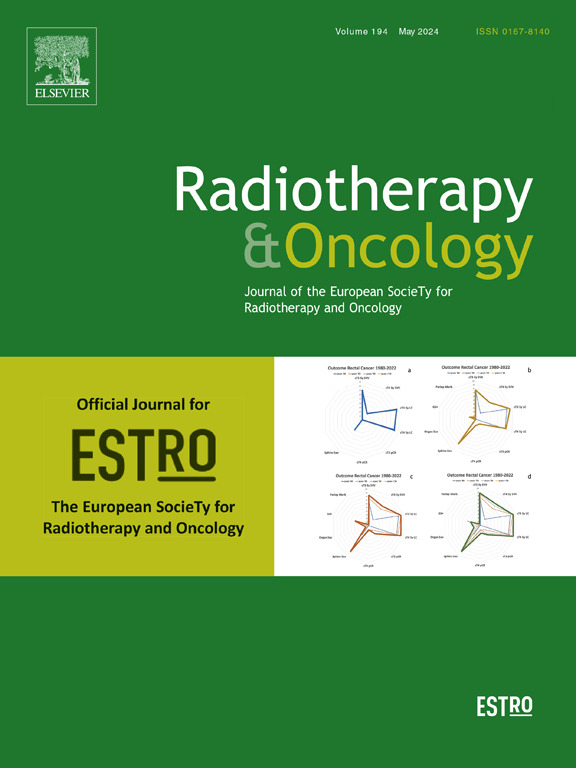Delphi consensus-based recommendations of tools and outcomes for the assessment of radiation dermatitis severity
IF 4.9
1区 医学
Q1 ONCOLOGY
引用次数: 0
Abstract
Introduction
Acute radiation dermatitis (ARD) is a common side effect experienced during radiation therapy (RT) for cancer. Published clinical trials for ARD use a myriad of assessment tools and outcomes to measure ARD severity, which limits the comparability of clinical trial results. Our study utilized a modified Delphi consensus survey to gather expert opinions on commonly used tools for ARD severity.
Materials and methods
Thirty experts were invited to participate in a two-round Delphi consensus survey. Of these, 80 % (24/30) completed the first round; and 92 % (22/24) completed the second round. The Delphi process was conducted using the REDCap platform to systematically collect expert opinions on 32 assessment tools and 11 key outcomes pertinent to the severity of ARD. Assessment tools and outcomes that achieved a consensus of ≥ 70 % among the experts were subsequently recommended.
Results
Expert recommendations included four tools (RTOG, CTCAE, RISRAS, and Skindex-16) and eight relevant outcomes (moist desquamation, pain, QoL, erythema, dry desquamation, pruritus/itching, necrosis/ulceration, and burning) for ARD severity assessment. Due to limited evidence, no biophysical parameters reached consensus. Further, experts suggested modifications to existing tools to improve measurement of ARD severity across all skin types.
Conclusion
Our study was the first step in standardizing ARD severity assessment with expert consensus recommendation for four tools and eight relevant outcomes. However, modifications to existing tools are necessary to promote validation and accuracy across all skin types. Future efforts should create a new comprehensive ARD severity assessment tool to address deficiencies in existing tools.
基于德尔菲共识的评估放射性皮炎严重程度的工具和结果的建议。
简介:急性放射性皮炎(ARD)是癌症放射治疗(RT)期间常见的副作用。已发表的ARD临床试验使用了无数的评估工具和结果来衡量ARD的严重程度,这限制了临床试验结果的可比性。我们的研究采用了改进的德尔菲共识调查来收集专家对ARD严重程度常用工具的意见。材料与方法:邀请30位专家参与两轮德尔菲共识调查。其中,80% %(24/30)完成了第一轮;92 %(22/24)完成第二轮。使用REDCap平台进行德尔菲过程,系统地收集专家对32种评估工具和11种与ARD严重程度相关的关键结果的意见。随后推荐的评估工具和结果在专家中达到 ≥ 70 %的共识。结果:专家建议包括评估ARD严重程度的四种工具(RTOG、CTCAE、RISRAS和skin index-16)和八种相关结果(湿脱屑、疼痛、生活质量、红斑、干脱屑、瘙痒/瘙痒、坏死/溃疡和灼烧)。由于证据有限,没有达成一致的生物物理参数。此外,专家建议对现有工具进行修改,以改善对所有皮肤类型的ARD严重程度的测量。结论:我们的研究是标准化ARD严重程度评估的第一步,专家一致推荐了四种工具和八种相关结果。然而,修改现有的工具是必要的,以促进所有皮肤类型的验证和准确性。未来的努力应该创建一个新的全面的ARD严重性评估工具来解决现有工具的不足。
本文章由计算机程序翻译,如有差异,请以英文原文为准。
求助全文
约1分钟内获得全文
求助全文
来源期刊

Radiotherapy and Oncology
医学-核医学
CiteScore
10.30
自引率
10.50%
发文量
2445
审稿时长
45 days
期刊介绍:
Radiotherapy and Oncology publishes papers describing original research as well as review articles. It covers areas of interest relating to radiation oncology. This includes: clinical radiotherapy, combined modality treatment, translational studies, epidemiological outcomes, imaging, dosimetry, and radiation therapy planning, experimental work in radiobiology, chemobiology, hyperthermia and tumour biology, as well as data science in radiation oncology and physics aspects relevant to oncology.Papers on more general aspects of interest to the radiation oncologist including chemotherapy, surgery and immunology are also published.
 求助内容:
求助内容: 应助结果提醒方式:
应助结果提醒方式:


